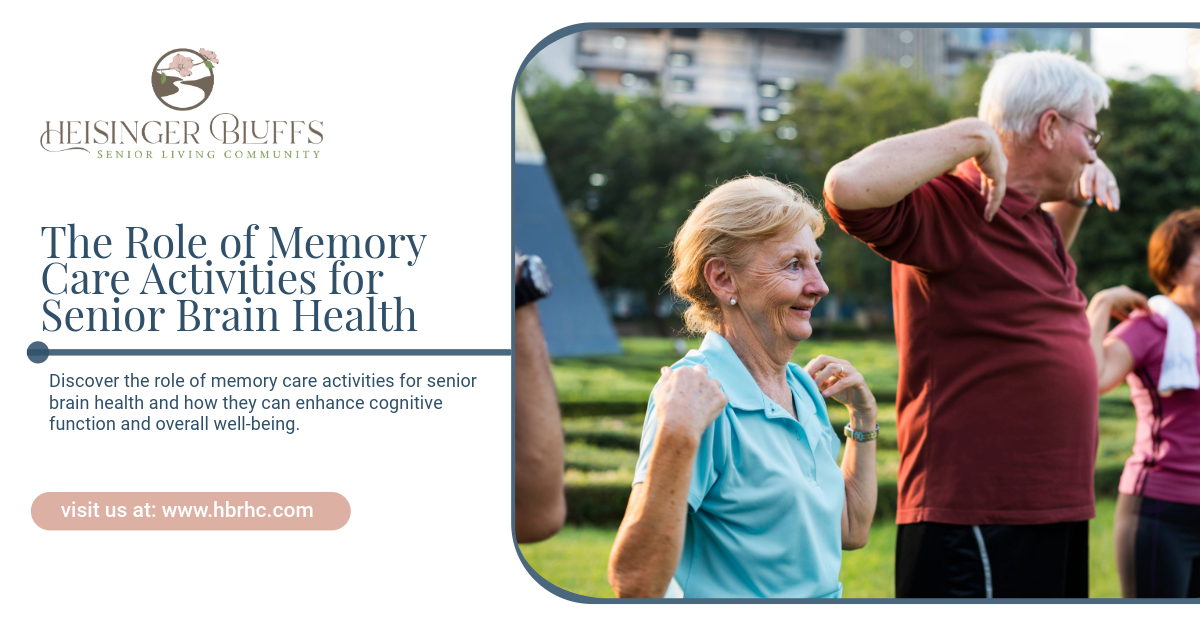The Role of Memory Care Activities for Senior Brain Health

Key Highlights
- Memory care activities are invaluable for enhancing cognitive function and brain health in older adults.
- Structured engagements promote mental sharpness, emotional support, and overall quality of life.
- Activities like physical exercise, brain games, and reminiscence therapy slow cognitive decline and strengthen memory retention.
- Tailored care plans ensure individual needs are met while fostering a sense of community and belonging.
- Regular participation in memory care programs boosts social interaction, helping seniors feel connected and supported.
- Family involvement plays a vital role in creating a secure and enriching memory care environment.
Caring for seniors with memory issues requires innovative approaches to support brain health and cognitive abilities. Memory care focuses on enhancing the quality of life for those experiencing cognitive decline by promoting mental activity, emotional stability, and social interaction. Effective strategies, such as engaging memory care activities, can help seniors maintain sharp minds and slow cognitive decline. This blog explores how these activities improve brain health, sustain cognitive function, and elevate the overall quality of life for senior residents.
Understanding Memory Care and Brain Health
Memory care is a special service for people who have memory issues from things like Alzheimer’s disease and dementia. It uses different therapies and activities to help boost brain health and cognitive abilities. At the same time, it gives important emotional and physical support to those who need it.
There is a strong focus on helping the brain stay healthy with fun and personal activities. These memory care programs are made to help with memory problems and also to offer a safe place where seniors can feel good, connect with others, and keep their dignity and independence.
What Is Memory Care?
Memory care is a specialized form of senior living for individuals with Alzheimer's, dementia, or cognitive impairments. In these settings, staff provide tailored care, medication assistance, and support with daily tasks while ensuring safety in secure environments.
Activities are designed to enhance emotional well-being and cognitive function, with a focus on mental stimulation to maintain brain health.
Memory care offers targeted programs and more support than general assisted living, fostering a nurturing environment for residents.
The Link Between Memory Care and Cognitive Function
Memory care is closely linked to cognitive function. Engaging in purposeful activities can slow cognitive decline.
Brain games and creative therapies keep the mind active and enhance problem-solving skills. Regular participation helps residents sharpen their mental abilities over time.
Additionally, memory care environments foster self-esteem by offering enjoyable and meaningful programs. These activities stabilize mood and support daily brain function.
The Importance of Engaging Activities in Memory Care
Structured activities in memory care are very important for seniors with memory loss or other conditions of the mind. These activities help with mental stimulation. They also give chances for social interaction and emotional growth.
By focusing on activities that fit each person, memory care helps bring back self-confidence. These programs also help build strong bonds in the community. When people do things together in these sessions, they get good mental health benefits. They also get stronger emotionally. This all adds up to a better way of senior living.
Why Activities Matter for Seniors with Memory Loss
Mental stimulation activities can slow memory loss in older adults. Engaging seniors in tailored tasks enhances cognitive skills like problem-solving and memory recall.
Daily routines incorporating memory care activities provide emotional stability and support independence, empowering seniors to feel safe and capable.
Group sessions foster social interaction, improving quality of life while reducing isolation, keeping older adults connected and motivated.
Evidence-Based Benefits of Activity Participation
Engaging in memory care activities offers significant benefits for cognitive, emotional, and physical well-being.
| Benefit | Impact |
|---|---|
| Cognitive Stimulation | Enhances memory retention and slows decline |
| Emotional Balance | Reduces stress and boosts self-esteem |
| Physical Health | Lowers the risk of mobility issues and brain shrinkage |
| Social Interaction | Strengthens community bonds and fosters belonging |
| Improved Problem-Solving | Sharpens critical thinking skills |
Evidence underscores the vital role these activities play in enhancing seniors' lives in memory care programs, making them essential to daily routines.
Physical Activities for Cognitive Vitality
Physical engagement benefits not just the body but also brain health and mental sharpness. Seniors in memory care programs participate in regular physical activities tailored for them.
Targeted exercises like walking and chair yoga enhance brain function, mobility, and flexibility. Each activity is customized to individual fitness levels, promoting focus, nourishing the brain, and maintaining essential connections for optimal brain health.
Types of Physical Activities Used in Memory Care
Physical activity in memory care helps keep seniors healthy. There is a focus on brain function and feeling good in the body.
- Walking Clubs: These give seniors a way to move around in safe places. Staff watch over them so they can be active.
- Chair Yoga: These are gentle stretches. They help with balance and make people move better.
- Resistance Training: Seniors use light weights or bands. This helps them get stronger.
- Group Dancing: These fun times let people move and spend time with others.
These different activities in memory care give people many chances to move their bodies and keep their minds busy. This helps with mental stimulation and staying fit.
How Exercise Supports Brain Health in Seniors
Exercise is shown by science to help blood move better through the body and to make the brain work better. This has a big effect on the memory and thinking of memory care residents.
Being active on a regular basis helps lower stress. It also helps keep hormone levels steady. These things are good for brain health. Doing things like tai chi helps people keep their bodies in sync and feel less worried at the same time.
Exercise also helps the brain grow in new ways, called neuroplasticity, and helps people keep their memory longer. This is important for seniors with cognitive decline. Programs that are planned out make sure all memory care residents can use these benefits every day.
Cognitive Stimulation Activities
Keeping the mind active with fun tasks is an important part of memory care. Some of these activities are brain games, puzzles, and memory recall practice. These help keep mental sharpness strong.
Doing these mental activities helps you get better at solving problems and staying focused. Cognitive stimulation can boost quality of life and help with brain health. This is why such tasks are so useful for seniors who want to enjoy their daily lives more.
Games and Puzzles for Mental Agility
Engaging in games and puzzles helps seniors sharpen their minds by enhancing memory, focus, and decision-making.
- Crossword Puzzles: Boost vocabulary and thinking skills.
- Sudoku: Develop logical reasoning.
- Card Games: Encourage pattern recognition and social interaction.
- Jigsaw Puzzles: Improve spatial awareness and problem-solving.
These enjoyable activities promote brain health and are commonly offered in memory care communities to enhance cognitive stimulation. They also foster connections and engagement among participants.
Reminiscence Therapy and Memory Recall Exercises
Reminiscence therapy aids seniors in recalling past moments, benefiting their mental health. Activities like storytelling and sensory items enhance memory recall.
Photo albums, music, and memory boxes can evoke vivid memories, strengthening brain pathways and promoting happiness among memory care residents.
This therapy encourages social interaction, fostering connections as residents share memories. These efforts create a supportive environment in memory care settings.
Creative and Expressive Therapies
Expressive therapies like music and art therapy give people in memory care a way to be creative and bring them emotional support. The activities can help to boost their mood and lower stress. They also help with good cognitive health.
When seniors in memory care settings join in activities based on art or music that they like, it can help them feel a connection to old memories. This brings big emotional and cognitive benefits.
Art and Music Therapy for Emotional and Brain Health
Art therapy allows seniors to express their feelings creatively while enhancing fine motor skills. Activities like painting, sculpting, and crafting promote emotional well-being and mental strength.
Music therapy offers unique benefits; seniors can sing, listen to familiar songs, or play simple instruments, often evoking cherished memories.
Both therapies reduce anxiety, stimulate brain activity, and bring joy to those in memory care.
Crafting, Writing, and Storytelling Activities
Creative activities ignite emotions and stimulate thinking in seniors in memory care.
Crafts allow self-expression and improve focus. Writing workshops, such as journaling or storytelling, enhance memory recall and imagination.
In storytelling groups, seniors can share their knowledge and experiences, helping them retain skills and connect with others in memory care.
Social Engagement and Group Interaction
Social activities benefit individuals with memory or cognitive challenges by providing purpose and fostering connections. Group activities reduce loneliness, build community, and enhance mood, positively impacting residents' mental health.
Programs emphasizing conversation and hands-on engagement offer seniors a fresh experience, promoting group energy and emotional satisfaction. Thus, social activities support mental health in various ways.
Group Outings and Community Events
Going out into the community helps seniors stay active and spend time in their environment.
When seniors take trips, like going to the park or joining social events, they get chances to talk with others. This can help with feelings of isolation. These outings also help people at memory care facilities build stronger bonds with each other.
Building Friendships and Reducing Social Isolation
Memory care settings prioritize building strong relationships through group activities and shared living spaces.
Eating meals, playing games, or doing crafts together fosters bonding, helping everyone feel included and a sense of belonging. These interactions provide emotional support tailored to senior living needs.
Stronger connections enable residents to cope with solitude better and create opportunities for genuine friendships, enhancing long-term mental health in memory care environments.
Personalizing Activities for Individual Needs
Customizing memory care activities to fit what seniors like or can do helps the staff members give them a better quality of life.
When staff members use plans that match personal likes, they help make experiences that are good for emotional and cognitive health. They also make sure to take care of each person’s different needs.
Tailoring Activities to Resident Interests
Personal care plans use hobbies and what people like to make fun daily plans for seniors.
These care plans begin with looking at each person to see what they like to do. This helps make sure they can enjoy the activities, and be a part of all things going on.
Monitoring Progress and Adjusting Approaches
Staff members keep a close watch on how things go and use what they find to keep making care plans better.
They also share regular updates with families and listen to what they say. This makes sure the programs always match what the residents need as things change.
Final Thoughts
Participating in memory care activities is essential for maintaining brain health, promoting physical wellness, and encouraging social connection. Whether through creative therapies, gentle exercises, or personalized cognitive programs, these activities can significantly enhance a senior’s overall well-being and quality of life.
At Heisinger Bluffs, we create a nurturing environment where residents thrive mentally, physically, and emotionally. If you're looking for compassionate, professional memory care that truly makes a difference, we invite you to visit us and discover how we support every stage of senior living. Contact us today and see how Heisinger Bluffs can help your loved one live life to the fullest.
Frequently Asked Questions
What types of activities are most effective for senior brain health?
Activities such as cognitive stimulation, brain games, physical movement, and social interactions greatly help brain health in seniors. When you mix structured programs with group activities, it helps memory care residents keep mental sharpness and feel emotionally balanced. This way, they get good results with their memory care every day.
How do memory care activities help slow cognitive decline?
Purposeful engagements in memory care help give residents emotional fulfillment and mental stimulation. This usually helps slow down cognitive decline. When people in memory care do activities that build cognitive skills, like working on puzzles or joining reminiscence therapy, it can help keep their brain health strong. These activities also help improve the overall quality of life for memory care residents.
Are memory care activities safe for seniors with advanced dementia?
Yes, memory care activities happen in safe places with staff members who are trained. They work to keep everyone with advanced dementia safe. People get help from staff duringthe every session. These activities in memory care are made to fit what each person can do. All of this takes place in safe spaces.
Sources:
- https://www.webmd.com/healthy-aging/what-to-know-about-cognitive-decline-in-older-adults
- https://www.healthline.com/health/mental-health/brain-exercises
- https://www.goodrx.com/health-topic/senior-health/chair-yoga-for-seniors
- https://www.ncbi.nlm.nih.gov/books/NBK557811/
- https://pmc.ncbi.nlm.nih.gov/articles/PMC9891430/











